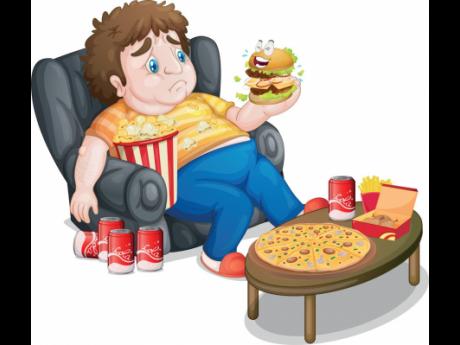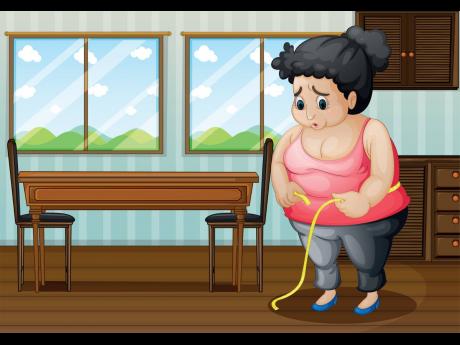Stop the fat shaming
“How yu get suh fat?” “Weh yuh a get big a guh?”
If you recognise these greetings, chances are you’re a Jamaican. We as a people love to comment on people’s weight. Asking women if they are pregnant or equating a beer belly to a man’s success are only a few examples of how our small talk orbits our midsection.
Historically, excess weight has been correlated with success and the good life. Wearing a few extra pounds meant that you could eat well and were prosperous. Being skinny was seen as unhealthy.
Growing up, there was a ‘Bigga’, ‘Biggs’, ‘Fatta’, and ‘Fatty’ in every school and community. I suspect they embraced the names without any thought of bullying, as years later they introduced themselves accordingly.
The overweight stood out back then, as obesity rates were closer to 10 per cent and there was no alarm then as to the chronic disease epidemic that is now fuelled by globally rising obesity rates.
As in other developing nations, the obesity epidemic is fairly new to Jamaica. Obesity rates have grown by 47 per cent between 2001 and 2017. Today, 54 per cent of Jamaicans are overweight, and a quarter of the population is obese. Obesity is a public health crisis in Jamaica and this complex issue necessitates a cultural shift in order to arrest one of the most rapid rates of increase in obesity in the world.
People battling with their weight have higher rates of depression and are more concerned with self-image than others with a normal BMI. As they try to sustain a caloric deficit, their bodies are actively trying to sabotage their weight-loss efforts by increasing hunger hormone levels and cutting metabolic rates. This well-researched phenomenon is called metabolic adaptation and is the main reason why morbidly obese individuals have only a five to 10 per cent success rate with diet and exercise.
RETREAT INTO A LONELY PLACE
Eating at the same rate that resulted in them losing a few pounds initially, yet not losing an ounce after a while, is enough to frustrate even the most dedicated dieter. Add to this the constant reminder by friends and family that you are losing the battle and it can lead to emotional issues. The ignorance of many health and wellness professionals leads them to inadvertently fat shame their clients who they accuse of not sticking to their diets or not exercising enough.
When those who you depend on for support are the very ones adding to your frustration, it is easy to retreat into a lonely place where you wonder if it’s worth the effort and just stop trying. It is in that corner where many persons who are struggling with weight issues find themselves and lose hope that they can escape the vicious dieting cycle.
Naturally, they do not show this vulnerability and laugh off the fat jokes and comments. We see nothing wrong with our jokes and mean comments because the victim is laughing too. And so we continue to fat shame those who need our encouragement without understanding the damage we are causing.
It needs to stop.
We live in a society where calorie-dense foods have never been this plentiful in our history. Our traditional diet laden with starch is not compatible with our new sedentary lifestyles in modern towns and cities.
We can’t exercise as much as we want because criminals attack joggers on the road, we don’t have enough green spaces and parks, and we spend so much time stuck in traffic that exercise time is limited.
The food and beverage industry hires the top marketing firms and spends billions of dollars annually trying to play on our weaknesses and desires to make us eat and drink more and more unhealthy foods.
LEARN TO BE EMPATHIC
In this world, how can we imagine less than half of Jamaicans being overweight? How can we dream of reversing the rapid increase in obesity rates when we continue to live in this obesogenic environment compounded by the fog of ignorance about obesity that blinds us to the struggles overweight persons face?
Many of the fat shamers themselves don’t realise that they are only one life-changing event away from weight issues. It is amazing how a new relationship, a new job, kids or an accident can lead to weight gain that is difficult to reverse.
Former athletes, gym rats and persons who have been extremely slim their whole lives can suddenly find themselves packing on the pounds before they even realise what’s happening. This is the situation with a significant number of overweight persons. Whereas some may be comfortable with their weight, others are trying hard, unsuccessfully, but with great effort to lose some pounds.
Many will not understand this unless they experience it themselves. But if we learn to be empathic towards the plight of others that we are so close to sharing, we can change our cultural response towards obesity.
Most persons do not want to talk about their weight, so stop bringing it up at every opportunity. If you haven’t seen someone in a while and they’ve gained weight, you don’t have to tell them. Chances are, they already know.
Find a better icebreaker. Try to imagine yourself in their situation and how you would feel if you were constantly harassed by those around you. After all, one day you may just be the one wishing for some empathy.
Dr Alfred Dawes is a general, laparoscopic and weight-loss surgeon; Fellow of the American College of Surgeons; former senior medical officer of the Savanna-la-Mar Public General Hospital; former president of the Jamaica Medical Doctors Association. @dr_aldawes. Email feedback to yourhealth@gleanerjm.com and info@islandlaparoscopy.com


